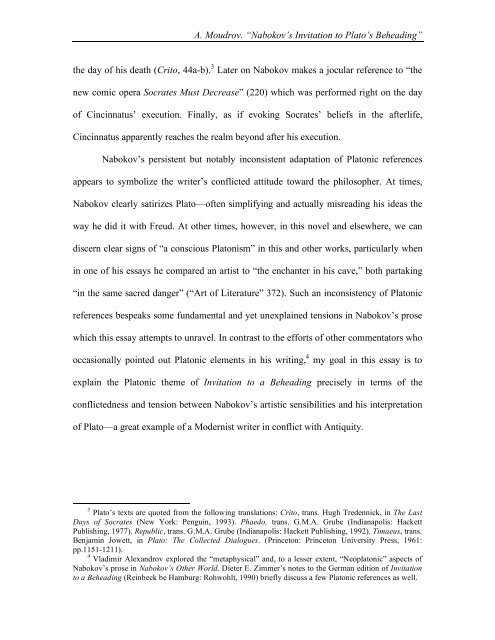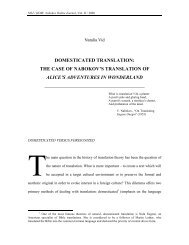Nabokov's Invitation to Plato's Beheading
Nabokov's Invitation to Plato's Beheading
Nabokov's Invitation to Plato's Beheading
- TAGS
- beheading
- etc.dal.ca
Create successful ePaper yourself
Turn your PDF publications into a flip-book with our unique Google optimized e-Paper software.
A. Moudrov. “Nabokov’s <strong>Invitation</strong> <strong>to</strong> Pla<strong>to</strong>’s <strong>Beheading</strong>”<br />
the day of his death (Cri<strong>to</strong>, 44a-b). 3 Later on Nabokov makes a jocular reference <strong>to</strong> “the<br />
new comic opera Socrates Must Decrease” (220) which was performed right on the day<br />
of Cincinnatus’ execution. Finally, as if evoking Socrates’ beliefs in the afterlife,<br />
Cincinnatus apparently reaches the realm beyond after his execution.<br />
Nabokov’s persistent but notably inconsistent adaptation of Pla<strong>to</strong>nic references<br />
appears <strong>to</strong> symbolize the writer’s conflicted attitude <strong>to</strong>ward the philosopher. At times,<br />
Nabokov clearly satirizes Pla<strong>to</strong>—often simplifying and actually misreading his ideas the<br />
way he did it with Freud. At other times, however, in this novel and elsewhere, we can<br />
discern clear signs of “a conscious Pla<strong>to</strong>nism” in this and other works, particularly when<br />
in one of his essays he compared an artist <strong>to</strong> “the enchanter in his cave,” both partaking<br />
“in the same sacred danger” (“Art of Literature” 372). Such an inconsistency of Pla<strong>to</strong>nic<br />
references bespeaks some fundamental and yet unexplained tensions in Nabokov’s prose<br />
which this essay attempts <strong>to</strong> unravel. In contrast <strong>to</strong> the efforts of other commenta<strong>to</strong>rs who<br />
occasionally pointed out Pla<strong>to</strong>nic elements in his writing, 4 my goal in this essay is <strong>to</strong><br />
explain the Pla<strong>to</strong>nic theme of <strong>Invitation</strong> <strong>to</strong> a <strong>Beheading</strong> precisely in terms of the<br />
conflictedness and tension between Nabokov’s artistic sensibilities and his interpretation<br />
of Pla<strong>to</strong>—a great example of a Modernist writer in conflict with Antiquity.<br />
3 Pla<strong>to</strong>’s texts are quoted from the following translations: Cri<strong>to</strong>, trans. Hugh Tredennick, in The Last<br />
Days of Socrates (New York: Penguin, 1993). Phaedo, trans. G.M.A. Grube (Indianapolis: Hackett<br />
Publishing, 1977). Republic, trans. G.M.A. Grube (Indianapolis: Hackett Publishing, 1992). Timaeus, trans.<br />
Benjamin Jowett, in Pla<strong>to</strong>: The Collected Dialogues. (Prince<strong>to</strong>n: Prince<strong>to</strong>n University Press, 1961:<br />
pp.1151-1211).<br />
4 Vladimir Alexandrov explored the “metaphysical” and, <strong>to</strong> a lesser extent, “Neopla<strong>to</strong>nic” aspects of<br />
Nabokov’s prose in Nabokov’s Other World. Dieter E. Zimmer’s notes <strong>to</strong> the German edition of <strong>Invitation</strong><br />
<strong>to</strong> a <strong>Beheading</strong> (Reinbeck be Hamburg: Rohwohlt, 1990) briefly discuss a few Pla<strong>to</strong>nic references as well.
















